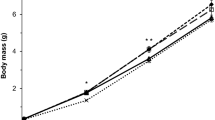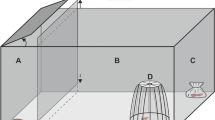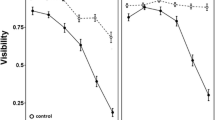Abstract
Previous studies have examined abiotic and biotic factors that facilitate agonistic behavior. For larval amphibians, food availability and conspecific density have been suggested as important factors influencing intraspecific aggression and cannibalism. In this study, we examined the separate and combined effects of food availability and density on the agonistic behavior and life history of larval long-toed salamanders, Ambystoma macrodactylum. We designed a 2×2 factorial experiment in which larvae were raised with either a high or low density of conspecifics and fed either a high or low level of food. For each treatment, we quantified the amount of group size variation, biting, and cannibalism occurring. Additionally, we examined survival to, time to and size at metamorphosis for all larvae. Results indicated that differences in both density and food level influenced all three life history traits measured. Moreover, differences in food level at which larvae were reared resulted in higher within-group size variation and heightened intraspecific biting while both density and food level contributed to increased cannibalism. We suggest that increased hunger levels and an uneven size structure promoted biting among larvae in the low food treatments. Moreover, these factors combined with a higher encounter rate with conspecifics in the high density treatments may have prompted larger individuals to seek an alternative food source in the form of smaller conspecifics.
Similar content being viewed by others
Author information
Authors and Affiliations
Additional information
Electronic Publication
Rights and permissions
About this article
Cite this article
Wildy, E.L., Chivers, D.P., Kiesecker, J.M. et al. The effects of food level and conspecific density on biting and cannibalism in larval long-toed salamanders, Ambystoma macrodactylum . Oecologia 128, 202–209 (2001). https://doi.org/10.1007/s004420100641
Received:
Accepted:
Published:
Issue Date:
DOI: https://doi.org/10.1007/s004420100641




